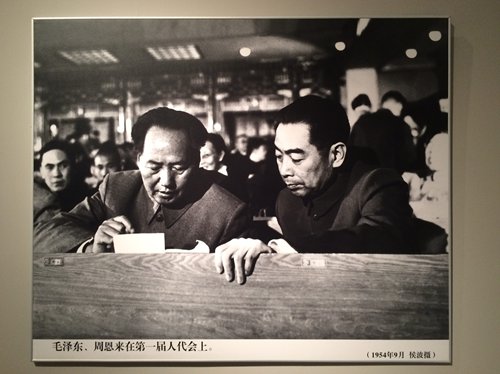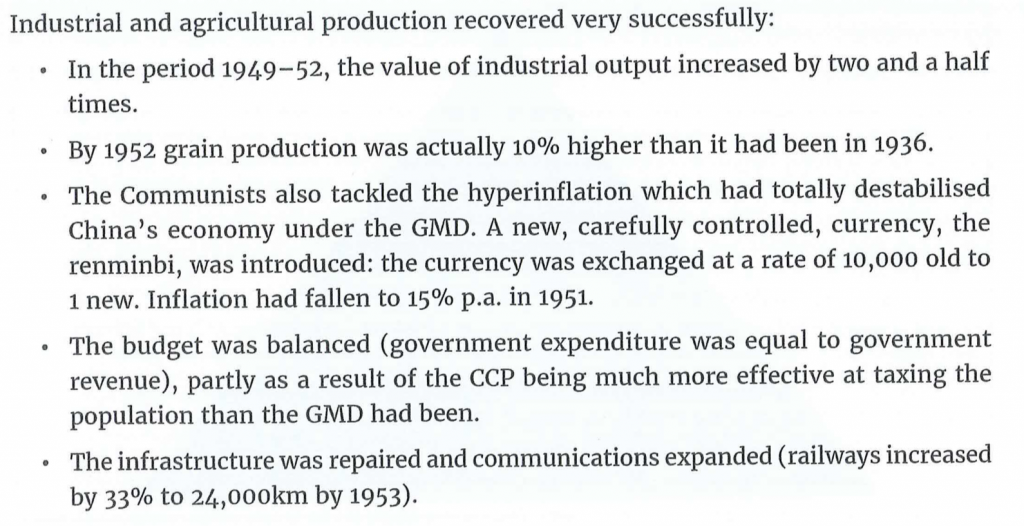- Timeline
- Cult of Personality
- Force, Land Reform and the Antis Campaigns
- 1954 Constitution
- Economy and the Five Year Plans
- Hundred Flowers Campaign and the Anti-Rightist Movement
- Mao and the Soviet Union
- Mao and Foreign Policy
Timeline
1950 Korean War, Chinese involvement, Marriage Law, Campaign against the counter-revolutionaries and land reform, the People’s Liberation Army invades Tibet.
1951 Three Antis Campaign
1952 Five Antis Campaign
1953 First Five-Year Plan, the Korean War ends.
1954 First PRC constitution
1956 Hundred Flowers Campaign, Khrushchev’s DeStalinisation speech.
1957 Anti-Rightest Movement
The last event is chosen to end Mao’s consolidation of power because he was able to remove the intelligentsia as an opposition. However, some sources identify the 1954 Constitution as establishing China as a one-party state. You can choose either of these dates but must explain why.
Cult of Personality
Frank Dikotter
- After the Chinese Civil War ended, all adults had to study ‘Mao Zedong Thought‘, many having to go back to school to do this. At the same time, the promises made in ‘On New Democracy‘ were broken gradually. The Party wanted to eliminate all private property, collectivise agriculture and massively increase defence spending. To maintain the support of the peasantry, Mao encouraged them to denounce their landlords and take what was ‘rightfully’ theirs. Two million died in the implementation of this policy. Moreover, people were also classified; they were either good, wavering or hostile to the revolution. This classification influenced your access to food, education, health care and employment. And if you were judged as hostile, this label was passed onto your children too!
- Just as in Nazi Germany and Stalin’s Soviet Union, books were burned and only those artists and authors loyal to Mao could work.
- He also hired a photographer called Hou Bo and her pictures (Mao Zedong swimming across the Yangzi in 1955) were published in their millions.

- Mao styled himself as a philosopher-king, one who thinks for all. His words, especially poetry, were published everywhere and educational courses set up to study (praise) his work.
- He made sure he was rarely seen, creating the illusion of being a god. He knew he was a great orator so he did not speak very much at public gatherings.
- Mao’s cult of personality suffered a setback when Khrushchev denounced Stalin after his death, so much of what Mao had said and done previously was copied from the former Soviet dictator. The speech was also a challenge to Mao’s leadership, Zhou Enlai, Liu Shaoqi and others spoke of collective leadership rather than just him. In response, Mao launched the Hundred Flowers Campaign, where people could publically voice their concerns. It backfired but the rise in opposition to the government meant that those who advocated a collective were now united with him.
Force, Land Reform and the Antis Campaigns
- Mao remained loyal to his peasant supporters by rewarding them with land reforms. Tribunals were held for landlords and, if found guilty of the exploitation of peasants, were punished and their land is taken off them. Hundreds of thousands were executed, allowing Mao to rid the country of opposition and ensuring the continued loyalty of the peasantry. The latter is evidence that he continued his strategy of gaining the support of the masses (see Political Ideology above).
- Tibet and Xinjiang were invaded and made a part of the new China, this Reunification Campaign was also aimed at protecting the country from other countries (USSR and India).

- The Suppression of Counterrevolutionaries (1950-1952) targeted GMD spies and was a response to the rebellions which broke out after the CCP came to power.
- “According to the official statistics from the Communist Party of China (CPC) and the Chinese government in 1954, at least 2.6 million people were arrested in the campaign, some 1.3 million people were imprisoned, and 712 thousand people were executed. However, scholars and researchers have given higher estimated death tolls. ” https://dbpedia.org/page/Campaign_to_Suppress_Counterrevolutionaries
- Three-Antis Campaign launched in 1951. The purpose was to eradicate three specific ‘ evils’: corruption, waste and bureaucracy.
- It targetted CCP members who had too close connections to capitalists.
- In 1951, Liu Qingshan and Zhang Zishan, two leading CCP members were arrested for corruption and living a wealthy lifestyle – they were executed the following year.
- Five-Antis campaign launched in 1952. It targetted capitalists who took part in bribery, tax evasion, theft of state property, cheating on government contracts and stealing economic information ( the five evils ).
- The policy encouraged people to spy and report these abuses.
- By 1953 around 450,000 private businesses had been charged with one of the ‘five evils’; around 340,000 were found guilty. Land, property and income were confiscated.
- The Five-Antis campaign generated money for the government and created an environment of fear.
1954 Constitution
- The electoral law from March 1, 1953, provided for one member for every 100,000 people in towns of more than half a million inhabitants, and one for 800,000 people in the countryside.
- The Chairman of the People’s Republic of China was elected for four years by the Congress. He presided over the National Defense Council, commanded the army, appointed and dismissed the Premier, and represented China in foreign affairs.
- All citizens were equal before the law, had the right to vote and stand for election, irrespective of their nationality, race, sex, occupation, social origin, religious belief, education, property status, or length of residence, except insane persons and persons deprived by law of the right to vote and stand for election. The last point is important, as it shows that personal rights for individuals could be abrogated.
- The Constitution stressed the freedom of speech, of the press, of assembly, association, procession, demonstration, religious belief, scientific research, and literary and artistic creation. Citizens had the right to work and that for education.
- Working people had the right to rest and leisure, and to material assistance in old age, and in case of illness or disability. The Constitution also guaranteed the right to make written or oral complaints to organs of state at any level against any person working in an organ of state for the transgression of law or neglect of duty.
Taken from http://www.chinaknowledge.de/History/PRC/prc-event-constitution1954.html
Economy and the Five Year Plans
Just as Lenin implemented the New Economic Policy in the Soviet Union, Mao introduced National Capitalism to solve the economic problems of the country. China had been devastated from both the civil war and the Second World War. Before a successful socialist revolution could take place, there had to be a growing economy. In National Capitalism, Mao worked with business people who were not supporters of the GMD as he needed their expertise. The following is taken from OSC’s Authoritarian States textbook.

In 1953, Mao tried to emulate Stalin’s Five-Plans to take China even further forward. The following is taken from AlphaHistory
- Michael Lynch argues that Mao’s economic strategy was also designed to seek out the opposition.
- The Five Year Plan was supported by Soviet Russia, which contributed advice, logistics and material support. Moscow provided a small loan of $300 million and, more importantly, the services of several thousand Soviet engineers, scientists, technicians and planners.
- Huge gains in steel, coal and petrochemicals.
- Created an urban/rural imbalance. While 84 per cent of the population lived in rural areas, 88 per cent of government investment was pumped into the heavy industry in towns and cities. Agriculture suffered, leading to Mao’s future policy of the Great Leap Forward.
- Prior to this, Mao introduced collectivisation. Agricultural Producers’ Cooperatives were formed to pool resources (including land) and produce more farm goods. Life expectancy rose from 36 to 57 years, city housing standards improved and urban incomes increased by 40 per cent.
- “The First Five Year Plan produced results that were impressive enough to sustain the Chinese leaders’ dreams .’ Michael Blecher
- Mao saw the first Five Year Plan as successful so he implemented the second aimed at creating more rapid progress – the Great Leap Forward.
Hundred Flowers Campaign and the Anti-Rightist Movement
- In 1956, Mao encouraged intellectuals to offer ideas or criticisms to improve China. He assured them that they would not be punished.
- The policy was driven by Zhou Enlai.
- It was either developed to genuinely improve China or to find potential opponents, who would then be arrested.
- Criticisms were slow to develop for fear of reprisals but by 1957 there were many, probably too many for Mao to accept. Consequently, the Anti-Rightist Movement was launched.
Anti-Rightist Movement
- Between 300 000 to 500 000 ‘Rightists’ (capitalists are considered ‘right’) were identified and either removed from their position of influence or sent to ‘re-education camps’.
- Mao – ‘We must lure the snakes away from their hideouts so that we can kill them.’
Mao and the Soviet Union
For Chung and Halliday’s analysis of Mao’s foreign policy towards the Soviet Union, read Chapters 32, 33 in this summary of the book.
- Mao respected Stalin and emulated some of his policies in China. This respect was tarnished after his visit to Moscow in 1949; he was kept waiting for weeks before he was granted an audience. However, when Stalin requested that China become involved in the Korean civil war he agreed. One could argue that he had to because the USSR was the only country which gave China aid. But if he had refused the request and relations became poor, this could affect his position as leader. Mao had spoken of his admiration for Stalin, the USSR and their ideology. Breaking or criticising them could affect the support he had from Chinese communists.
- 1956 and General Secretary Khrushchev changed this situation.
- Khrushchev in Water Wings: On Mao, Humiliation and the Sino-Soviet Split
8. Mao and Foreign Policy
